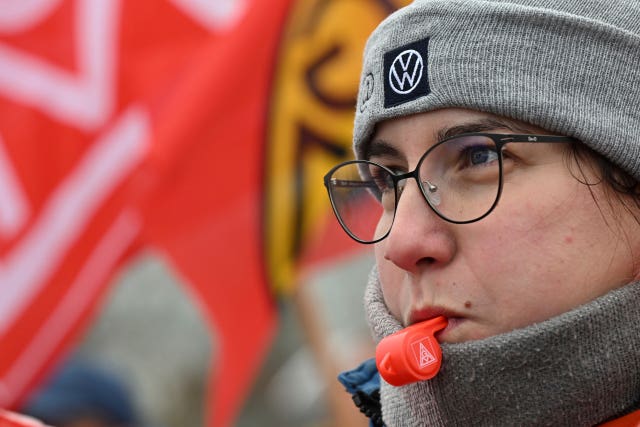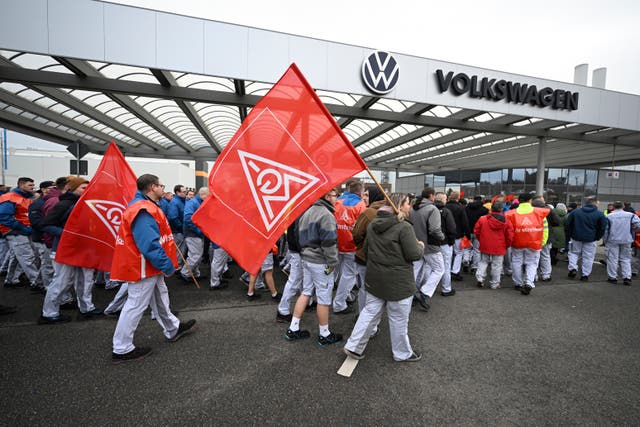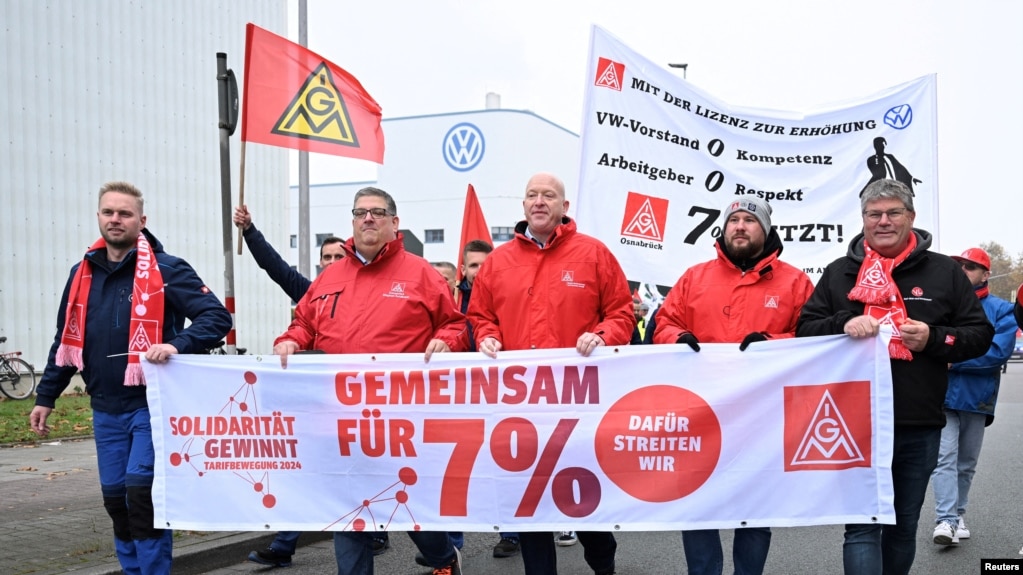Volkswagen workers hold strikes over proposed pay cuts and factory closures
2 December 2024

Workers face the threat of the car giant’s first factory closures in its home country.
Volkswagen workers have launched rolling two-hour strikes at nine factories across Germany to underline their resistance to pay cuts and factory closures the company says are necessary to cope with a slack European car market.
The stoppages included the company’s base plant at Wolfsburg, where workers are due to rally against a cost-cutting drive by the carmaker’s management in which they face the threat of Volkswagen’s first factory closures in its home country.
The so-called warning strikes, a common tactic in German wage negotiations, are taking place as part of talks for a new labour agreement after a mandatory peace period that bars strikes expired on Sunday.
The IG Metall industrial union said any job actions beyond those occurring on Monday would be announced later.

The company is demanding a 10% pay cut for 120,000 German workers and has said it cannot avoid shedding factory capacity that is no longer needed. Employees’ representatives say the company has proposed closing three of its German plants.
Thorsten Groger, the regional leader of the IG Metall industrial union in Lower Saxony, where Volkswagen is headquartered, said that the company won’t be able to “overlook” the walkouts.
“If necessary, this will be one of the toughest conflicts Volkswagen has ever seen.”
The company has not publicly detailed its plans but is facing a drop in demand in Europe, higher costs and increasing competition from Chinese carmakers.

Volkswagen built factories to supply a European car market of 16 million in annual vehicle sales, but now faces demand for around 14 million, Volkswagen brand head Thomas Schaefer was quoted as saying in the Welt am Sonntag newspaper.
Since Volkswagen has a quarter of the market, that represents a loss of 500,000 cars a year.
For years, strong profits in China helped cover higher costs but the changing environment now means that “it’s high time to address this,” Mr Schaefer said.
Volkswagen argues that it must lower costs in Germany to levels achieved by competitors and by Volkswagen plants in eastern Europe and South America.

Chief employee representative Daniela Cavallo has said employees should not shoulder the burden of management’s failures to develop attractive products and come up with a cheaper, entry-level electric vehicle.
The walkouts began in Zwickau in eastern Germany and were set to continue at plants in Braunschweig, Chemnitz, Dresden, Emden, Hanover, Kassel, and Salzgitter.
The next negotiations are slated for December 9.
Nine Volkswagen plants to strike as labor battle escalates
December 02, 2024
By Reuters

BERLIN —
Workers at nine Volkswagen car and component plants across Germany will strike for several hours on Monday, IG Metall union said, bringing assembly lines to a halt as labor and management clash over the future of the carmaker's German operations.
Thousands are expected to gather at the carmaker's headquarters in Wolfsburg. Demonstrations are also expected at the Hanover plant, which employs around 14,000 people, and other component and auto plants including Emden, Salzgitter, and Brunswick.
The strikes, which could escalate into 24-hour or unlimited strikes if a deal is not struck in the next round of wage negotiations, will put a dent in Volkswagen's output at a time when the carmaker is already facing declining deliveries and plunging profit.
"How long and how intensive this confrontation needs to be is Volkswagen's responsibility at the negotiating table," Groeger said on Sunday.
A company spokesperson on Sunday said the carmaker respected workers' right to strike and had taken steps to ensure a basic level of supplies to customers and minimize the strike's impact.
The union last week proposed measures it said would save $1.6 billion, including forgoing bonuses for 2025 and 2026, which Europe's top carmaker dismissed.
Volkswagen has demanded a 10% wage cut, arguing it needs to slash costs and boost profit to defend market share.
The company is also threatening to close plants in Germany, a first in its 87-year history.
An agreement not to stage walkouts ended on Saturday, enabling workers to carry out strikes from Sunday across VW AG's German plants.
The labor union called on employees of the plants housed under subsidiary Volkswagen Sachsen GmbH, which include VW's EV-only plant Zwickau, to strike on both Monday and Tuesday.
Negotiations will continue on Dec. 9 over a new labor agreement, with unions vowing to resist any proposals that do not provide a long-term plan for every VW plant.
Volkswagen workers worry about future as they stage warning strikes
Thousands of workers at Volkswagen's headquarters in Wolfsburg launched warning strikes on Monday, with the works council accusing shareholders of prioritising billions in profits while workers face job insecurity and potential layoffs.
The sounds of whistles and chants echoed through Wolfsburg, home to Germany’s Volkswagen's headquarters, on Monday as workers staged protests.
Tens of thousands of VW employees across Germany halted production every few hours, following failed negotiations between the carmaker and unions.
Volkswagen plans to close three plants, cut thousands of jobs, and slash wages by 10% to save costs, citing sluggish car demand, rising labour expenses, raw material shortages, and delays in the shift to electric vehicles.
The Wolfsburg strike began with the works council sharply criticising shareholders Porsche and Piëch, accusing them of making billions in profits over the past decade while workers now face the possibility of mass layoffs and wage cuts.
In Germany, works councils, which function similarly to employee councils, are elected bodies representing workers' interests directly to management and operate independently from trade unions.
The VW works council is urging the company to find a fair solution that avoids job losses and factory closures.
Christian Koziol, a Volkswagen employee with over 40 years of service, is deeply concerned about the future of Wolfsburg.
"What about our children — where will they work in the future? It’s very unsettling," he told Euronews.
Commenting on the impact of political decisions on the car industry, Koziol acknowledged the importance of climate protection and said, "Looking back, we must admit that the emphasis on CO2 limits, compliance, and potential penalties likely constrained many companies in their decision-making."
"They had no other option but to move towards e-mobility to comply with these standards. This cuts across the entire industry," Koziol said.
He also questioned whether policies on subsidies were well-designed, adding: "Was it wrong to end the subsidies? Was it wrong to set the subsidies so high at first, only to abruptly stop them? All these factors impact the automotive industry."
Atmosphere remains tense
The mood in Wolfsburg is sombre, as talks between the union and VW are set to continue next Monday. The union is also threatening harder strikes if no agreement is reached.
With snap elections coming up in February, and the car industry very much the backbone of the German economy, it seems more likely that the country will vote to change leadership.
But declining demand is not just affecting Germany. Italy, France and Belgium are also facing a dramatic sales slump, posing a broader risk of economic instability across the eurozone.

No comments:
Post a Comment